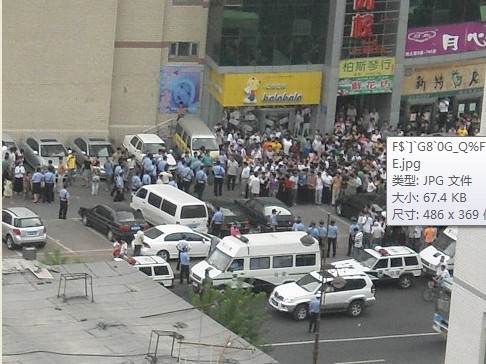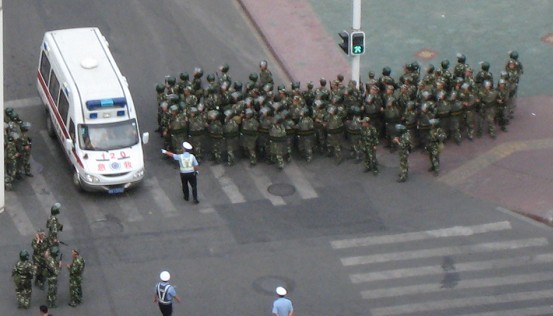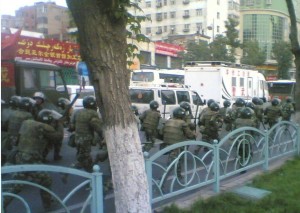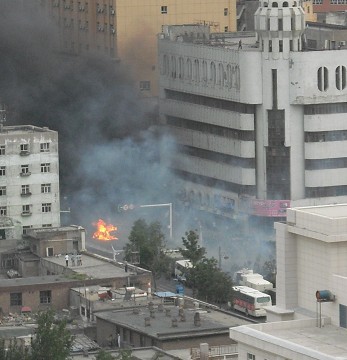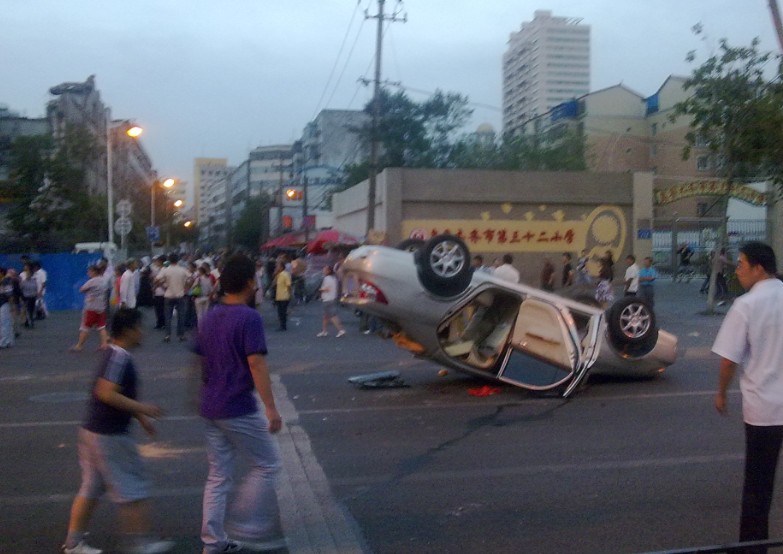A rare outbreak of unrest has erupted in Urumqi, Xinjiang. Reports say it was triggered by violence at a factory in Guangdong between Han and Uighur workers. From BBC:
Three people have been killed and more than 20 injured in violence in the city of Urumqi in China’s restive Xinjiang region, state media says.
Xinhua news agency said police had rushed to the city to restore order after demonstrators attacked passers-by and set fire to vehicles.
Xinhua did not say how many people were involved or what their motive was.
But activists and eyewitnesses said that those involved in the unrest were minority Muslim Uighurs.
A report from the Los Angeles Times gives more details:
The official New China News Agency said rioters were “attacking passersby and setting fire to vehicles,” but representatives for the Uighurs, a Muslim minority, described a peaceful demonstration that turned ugly because of government brutality.
Witnesses reported that riot police arrived on the scene in armored personnel carriers, dispersing the crowd with water cannons and tear gas, and firing warning shots into the air. At least 300 people were reported to be arrested. There were unconfirmed reports of deaths and injuries.
[…] The protests today were triggered by the June 26 killing of two young Uighur men at a toy factory in Guangdong province. According to Uighur sources, the men were beaten to death by a mob, enraged by false rumors that they had sexually harassed Han women.
Xinhua has already apportioned blame for the violence on exiled Uighur activist Rebiya Kadeer, based in Washington D.C., according to this report:
Initial investigation showed the unrest was masterminded by the World Uyghur Congress led by Rebiya Kadeer.
“The unrest is a preempted, organized violent crime. It is instigated and directed from abroad, and carried out by outlaws in the country,” a government statement said early Monday.
According to the government, the World Uyghur Congress has recently been instigating an unrest via the Internet among other means, calling on the outlaws “to be braver” and “to do something big.”
Nur Bekri, chairman of the Xinjiang regional government, said in a televised speech Monday morning that the move came after a conflict between Uygur and Han ethnic people in a toy factory in the southern Guangdong province in June 26, which led to the death of two Uygur workers.
Some comments from Chinese twitterers:
1. 无论身在何处,我都认为这个世界上最美丽的地方就是我的家乡乌鲁木齐。那里的一山一水一草一木每一个人都让我念念不忘。我永远属于那里。各民族和睦相处,难道这真是遥不可及的梦想吗?老天保佑善良的市民。不眠夜。
“No matter where I am, I think the most beautiful place on earth is my hometown, Urumqi. I can never forget the mountains, rivers, grasslands and trees, and the people. I will always belong to that place. All the ethnic groups co-existing in harmony, is this really an unreachable dream? God bless the kindhearted citizens. Sleepless nights.”
2. 虽然从小生活在新疆,我也有过汉族的民族优越感,而这种优越感可能使我对维族和其他少数民族产生心理歧视,原来没意识到,一直到自己看见这类民族冲突引发的暴力事件,才发现自己思想的狭隘,才意识到“民族自治”的真正意义。
“Although I lived in Xinjiang since I was little, I also have felt a sense of Han superiority, and this sense of superiority may have made me discriminate against Uighurs and other minorities. Originally I wasn’t even aware of this until I saw these types of violent ethnic conflicts, and then I discovered the narrowness of my own thinking, and became aware of the true significance of ‘ethnic autonomy.'”
Read what people are saying about this topic on twitter.
Also from Chinese blogger Yang Jie 杨杰:
2个多小时前,驱车经过乌鲁木齐人民广场(此广场在新疆的地位相当于天安门广场之于北京)时,偶然撞上了突发的骚乱场面,看见数百人(或许上千人)有组织地聚集在这里游行滋事,而且参加者都是维吾尔族人,他们中有人用汉语喊口号,有人用维语喊口号,吸引了无数人旁观。从他们半生不熟的汉语判断,应该不是乌鲁木齐本地的维吾尔族人(因为居住在新疆首府乌鲁木齐的维族人说汉语说得很流利)。这个广场的北侧是新疆区党委(省委)所在地,东南侧是区政府(省政府)所在地,历来就是城市的心脏地带,也是居住在周边的各族市民最喜欢光顾驻留的公共宵夜场所,在夏季的夜里总是人满为患。广场中心,矗立着人民解放军进疆纪念碑(新疆和平解放纪念碑),碑体与北京天安门广场的人民英雄纪念碑很相似。
About two hours ago, I drove by the People’s Square of Urumqi. (The square’s importance for Xinjiang is equivalent to the importance of Tiananmen Square for Beijing.) I coincidentally ran into the sudden riot. I saw hundreds (maybe almost a thousand) people gathered here marching, in an organized way. All participants were Uighurs. Some of them were shouting slogans in Chinese, and some in Uighur. They attracted a large crowd. Judging from their half-baked Chinese, they were probably not Uighurs from Urumqi, since Uighurs in the regional capital Urumqi usually speak fluent Chinese. The north of the Square is where the Party Committee of Xinjiang is, and the southeast side of the Square is where the provincial government building is. This is the heart of the city. It is also a popular place for residents of all ethnicities living nearby to spend their time in the evening. On summer nights the square is always very crowded. In the center of the Square, the monument of the People’s Liberation Army Entering XInjiang (also called the Monument of the Peaceful Liberation of Xinjiang) stands tall. The monument is similar to the Monument to the People’s Heroes in Tiananmen Square in Beijing.
And from blogger Li Puman (李普曼):
在网上乌鲁木齐二道桥维族暴乱的消息时,看到一些本族人的评论,许多人都支持武力镇压。而在乌鲁木齐的维族人,则毫无疑问的把所有的暴力对象都指向了汉人和汉人的财产。
原来在经济迅猛发展的掩盖下,民族间的对立也已经如此严重。我们彼此间充满了仇恨、不相信,于是彼此厮杀,暴力对抗暴力。我们彼此都成了不肯互相原谅,不愿意和解的民族?
又或者,是政府从来没想过和解。以至于许多人放弃了和解的希望?
I saw news online about riots in Urumqi, and read some of our Han Chinese opinions. Many comments support the use of force to crack down. And for the Uighurs in Urumqi, no doubt their target all pointed to Han Chinese and their properties.
Under the surface of rapid economic development, the conflict between ethnic nationalities is so severe. We are full of hatred and mistrust. We are killing each other, using violence against violence. We have become people who do not forgive and who do not want to reconcile.
Or, is it the government who has never thought about reconciliation, and therefore many people have given up the hope of reconciliation?
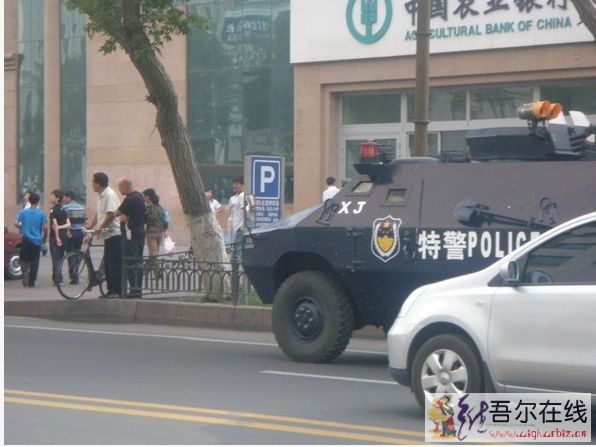
Update: Also see posts from English Xinjiang-based bloggers, Far West China and This is Xinjiang.
Listen to a statement by Nur Bekri, Chairman of the Xinjiang Uighur Autonomous Region, linking the riot today to the Shaoguan brawl, and blaming Rebiya Kadeer and others for using the Internet to stir up anger among Uighurs. 
The clashes on Sunday began when the police confronted a protest march held by Uighurs to demand a full government investigation of an ethnic brawl between Uighur and Han workers that erupted in Guangdong Province overnight on June 25 and June 26. The brawl took place in a toy factory and left 2 Uighurs dead and 116 people injured. The police later arrested a bitter ex-employee of the factory who had ignited the fight by starting a rumor that 6 Uighur men had raped 2 Han women at the work site, Xinhua reported.
There was also a rumor going around on Sunday in Urumqi that a Han man had killed a Uighur earlier that day in the city, said Adam Grode, an English teacher living in the neighborhood where the rioting took place.
“This is just crazy,” Mr. Grode said by telephone Sunday night. “There was a lot of tear gas in the streets, and I almost couldn’t get back to my apartment. There’s a huge police presence.”
See also from Forbes, “Uighur Unrest: Will Xinjiang become another Tibet in 2009?” and a report from The Times.
Speaking of Tibet in 2008, here is CDT’s translation of “Tibet: Her Pain, My Shame” by Tang Danhong last year.




